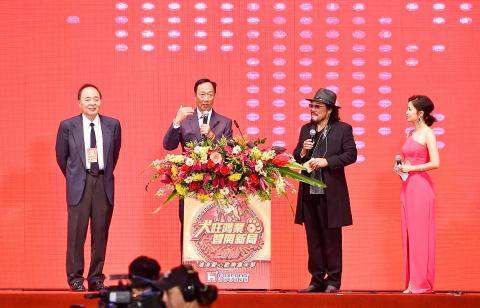Hon Hai Precision Industry Co (鴻海精密) plans to connect its supply chain partners’ industrial data within the next three years and develop 8K-resolution products to speed up the firm’s corporate transformation, chairman Terry Gou (郭台銘) said yesterday.
“This is the second phase of Hon Hai’s corporate transformation. The work from now to 2020 will be very important for us to completely become a big data, artificial intelligence and “smart” manufacturing company,” Gou said in his opening remark at the company’s annual carnival for employees at the Nangang Exhibition Hall.
More than 30,000 employees and their families from 32 different countries attended Hon Hai’s eight-hour carnival.

Photo: Fang Pin-chao, Taipei Times
Gou said he expects more employees to be dispatched to the US, Europe, India and Southeast Asian nations in the coming years, as Hon Hai continues to expand its global manufacturing network.
“We plan to host a ground-breaking ceremony for our manufacturing base in Wisconsin in the US by the end of April,” Gou told reporters, adding that it is snowing in Wisconsin, which is not suitable for ground-breaking.
Hon Hai had said that it plans to invest US$10 billion to set up a “smart” manufacturing facility in Wisconsin that focuses on 5G connectivity devices and 8K-resolution displays.
Gou and Sharp Corp president and chief executive officer Tai Jeng-wu (戴正吳) have been promoting 8K-resolution products in the belief that the wide use of 8K-resolution displays, cameras and content would play a crucial role in collecting and analyzing big data.
Hon Hai is in talks with RED.com LLC, a digital cinema camera manufacturer that worked with Netflix Inc to shoot the popular House of Cards in 4K, to invest in the firm or set up a joint venture to develop 8K products, Gou said, without elaborating.
Tai said he hopes Sharp would be able to reduce the price and weight of 8K consumer cameras, in an effort to accelerate the penetration rate of 8K products in the market.
Tai added that Sharp board member Young Liu (劉揚偉), who doubles as Hon Hai’s semiconductor subgroup head, is pushing toward a technological breakthrough for optical sensors in 8K cameras, which would make them smaller.
“I hope I will be able to introduce a lighter, smaller 8K camera that costs less than NT$200,000 [US$6,802.72] a year from now,” Tai told reporters.
On Friday, Hon Hai reported revenue of NT$400.6 billion for last month, which expanded 16.01 percent annually, but plunged 40.66 percent from the previous month.
Hon Hai attributed the decline to the weakness of its consumer electronics products, which include iPhones, amid traditional seasonality.

Taiwan’s rapidly aging population is fueling a sharp increase in homes occupied solely by elderly people, a trend that is reshaping the nation’s housing market and social fabric, real-estate brokers said yesterday. About 850,000 residences were occupied by elderly people in the first quarter, including 655,000 that housed only one resident, the Ministry of the Interior said. The figures have nearly doubled from a decade earlier, Great Home Realty Co (大家房屋) said, as people aged 65 and older now make up 20.8 percent of the population. “The so-called silver tsunami represents more than just a demographic shift — it could fundamentally redefine the

The US government on Wednesday sanctioned more than two dozen companies in China, Turkey and the United Arab Emirates, including offshoots of a US chip firm, accusing the businesses of providing illicit support to Iran’s military or proxies. The US Department of Commerce included two subsidiaries of US-based chip distributor Arrow Electronics Inc (艾睿電子) on its so-called entity list published on the federal register for facilitating purchases by Iran’s proxies of US tech. Arrow spokesman John Hourigan said that the subsidiaries have been operating in full compliance with US export control regulations and his company is discussing with the US Bureau of

Businesses across the global semiconductor supply chain are bracing themselves for disruptions from an escalating trade war, after China imposed curbs on rare earth mineral exports and the US responded with additional tariffs and restrictions on software sales to the Asian nation. China’s restrictions, the most targeted move yet to limit supplies of rare earth materials, represent the first major attempt by Beijing to exercise long-arm jurisdiction over foreign companies to target the semiconductor industry, threatening to stall the chips powering the artificial intelligence (AI) boom. They prompted US President Donald Trump on Friday to announce that he would impose an additional

China Airlines Ltd (CAL, 中華航空) said it expects peak season effects in the fourth quarter to continue to boost demand for passenger flights and cargo services, after reporting its second-highest-ever September sales on Monday. The carrier said it posted NT$15.88 billion (US$517 million) in consolidated sales last month, trailing only September last year’s NT$16.01 billion. Last month, CAL generated NT$8.77 billion from its passenger flights and NT$5.37 billion from cargo services, it said. In the first nine months of this year, the carrier posted NT$154.93 billion in cumulative sales, up 2.62 percent from a year earlier, marking the second-highest level for the January-September